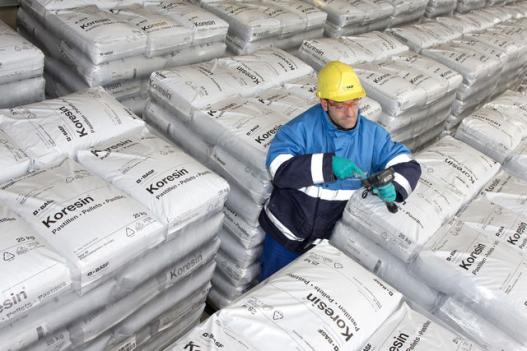Jul 6 2013
BASF is expanding and modernizing its production facility for its Koresin branded phenolic resin at its Ludwigshafen Verbund site.
 BASF is expanding and modernizing its production facility for Koresin® phenolic resin at the Ludwigshafen Verbund site. The company will increase its Koresin capacity by 50 percent. Koresin plays a key role in premium tire manufacturing processes. Our photo shows BASF employee Lars Holz preparing pallets of Koresin for shipping. (Photo: BASF - The Chemical Company, 2013)
BASF is expanding and modernizing its production facility for Koresin® phenolic resin at the Ludwigshafen Verbund site. The company will increase its Koresin capacity by 50 percent. Koresin plays a key role in premium tire manufacturing processes. Our photo shows BASF employee Lars Holz preparing pallets of Koresin for shipping. (Photo: BASF - The Chemical Company, 2013)
The company will increase the product capacity by 50 %. As a key measure, a second production line is being built and is scheduled to start operations in 2014. Used as a tackifier, Koresin plays a key role mainly in premium tire manufacturing processes.
“We are modernizing and expanding our Koresin facility to meet our customers’ increasing demand also in the future,” said Dr. Axel Kistenmacher, Business Manager Rubber Intermediates, BASF Intermediates division, and added, “We are additionally improving supply reliability by setting up a second production line.” Apart from car and truck tires, Koresin is also used to manufacture aircraft tires and tires for agricultural vehicles. Other applications include abrasion-resistant belt conveyors for heavy loads.
In tire production, various layers based on different rubber mixes are combined prior to the process of vulcanization. Small quantities of Koresin are sufficient to ensure homogeneous adhesion and crosslinking of the different tire components. At the same time this makes the end products safer and more durable. The use of Koresin facilitates advance production of traditional as well as modern high-silica rubber formulations, enabling them to be stored and transported for a long period. This eases time constraints in consecutive process steps and allows for greater flexibility in production. BASF has been producing Koresin from acetylene and t-butylphenol at its Ludwigshafen Verbund site for more than 70 years.
In addition to Koresin, BASF offers further products that are used in the tire and rubber industries: tertiary butylamine (tBA) and morpholine. Both of them are key raw materials for the manufacture of vulcanization accelerators.